How Harry Potter, Close Encounters And The 1952 Box Inspired Tomorrowland [Jeff Jensen Interview]
I talk with Jeff Jensen about how he went from a television writer at Entertainment Weekly to collaborating with Damon Lindelof and Brad Bird on the story for Tomorrowland. I must admit, I planned to go in and talk to Jensen about how the 1952 box was fabricated and how the script influenced the box and how the box influenced the script, but I found myself kind of blindsided with Jensen's reaction. Jeff continued to pretend that the 1952 box wasn't a creation of the team behind the film, which threw most of my prepared questions out the window. We still discuss how the box was used to sell executives and early Disney fans on the ideas behind the backstory of the movie.
I talk to Jeff about the early development of the film which saw two dueling ideas, one being a more Harry Potter approach and another more inspired by Close Encounters of the Third Kind. We also talk about the amazing Plus Ultra backstory which didn't fully make it into the film but can be discovered through the tie-in prequel novel Before Tomorrowland he also wrote. Read all this and more in my Jeff Jensen Tomorrowland interview, after the jump.
Jeff Jensen Tomorrowland Interview
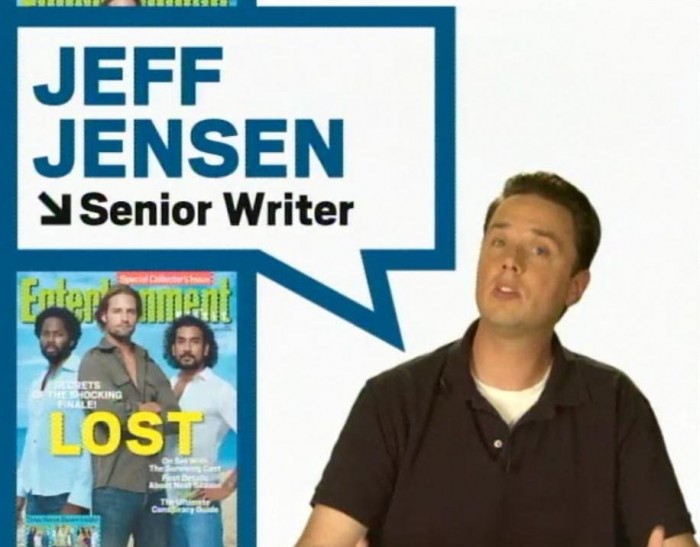 Peter Sciretta: Most of my readers, the Slash Film audience, probably know you best from all your exceptional coverage on Lost in Entertainment Weekly and EW.com. How did you go from that place to pitching this idea to Damon Lindelof? Or how did is all come together?Jeff Jensen: It was after Lost was over, so Lost ended like May 2010. And so it was very early 2011. Damon was already in talks with Disney about working on a film. It was gonna be a science fiction film. It was gonna deal with themes of Disney futurism. And it was orbiting around the name Tomorrowland. And there was a lot of things that were coming up in those conversations that would require say like research into Disney past, research into futurism and science fiction. And he thought of me in terms of the recaps I had done, the friendship that had started between us after Lost was over. He knew that this was kind of like right in my bailiwick. That I could be useful perhaps to him in a researching that stuff and maybe turning research of history into story ideas. And so–
Peter Sciretta: Most of my readers, the Slash Film audience, probably know you best from all your exceptional coverage on Lost in Entertainment Weekly and EW.com. How did you go from that place to pitching this idea to Damon Lindelof? Or how did is all come together?Jeff Jensen: It was after Lost was over, so Lost ended like May 2010. And so it was very early 2011. Damon was already in talks with Disney about working on a film. It was gonna be a science fiction film. It was gonna deal with themes of Disney futurism. And it was orbiting around the name Tomorrowland. And there was a lot of things that were coming up in those conversations that would require say like research into Disney past, research into futurism and science fiction. And he thought of me in terms of the recaps I had done, the friendship that had started between us after Lost was over. He knew that this was kind of like right in my bailiwick. That I could be useful perhaps to him in a researching that stuff and maybe turning research of history into story ideas. And so–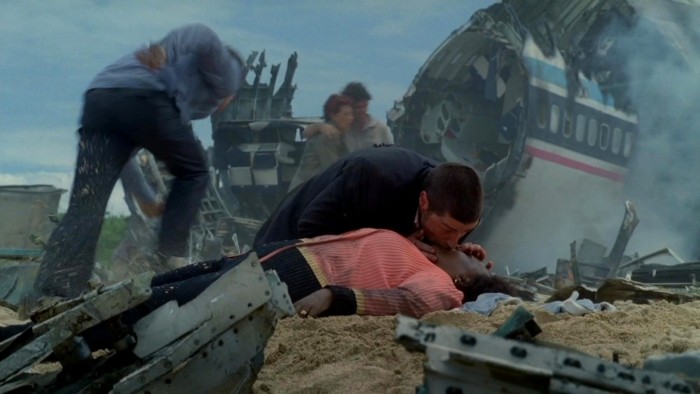 Peter: Yeah, because you weren't just like recapping Lost, you were finding things that might not even be there in the fabric of it.Jeff Jensen: Oh absolutely. I was projecting more than I was actually like finding in the text. And Wikipedia was my best friend. I got my doctorate from Wikipedia while working on Lost. And because of those interests like yeah, like that's how it started between us. And I did research for him and then we started working on that new story and then throughout 2011 we worked on the story.
Peter: Yeah, because you weren't just like recapping Lost, you were finding things that might not even be there in the fabric of it.Jeff Jensen: Oh absolutely. I was projecting more than I was actually like finding in the text. And Wikipedia was my best friend. I got my doctorate from Wikipedia while working on Lost. And because of those interests like yeah, like that's how it started between us. And I did research for him and then we started working on that new story and then throughout 2011 we worked on the story.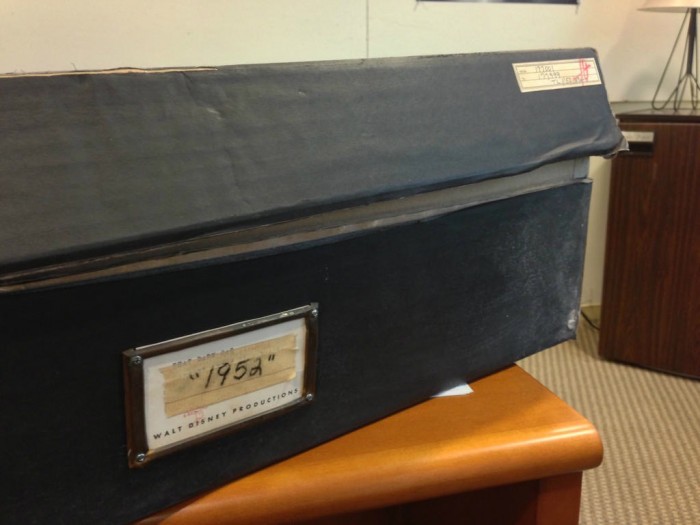 Peter: Okay, the public side of things. There was this unboxing of this mystery box that was found in the archives. That was a created MacGuffin by you guys. Can you talk a little bit about that and how that came about?Jeff Jensen: My relationship to the box was twofold. One is strictly inspiration during a very specific time in our pre-production and sort of being able to it was just this wonderful, I always likened it to it was like some Imagineer's junk drawer of Disney futurism. And it was just filled with stuff that was just really great to think about and get us, help get us sort of in the mood of Disney futurism. And then where it became really handy was at D23 that year when we were, you know, wanting to communicate to the Disney fans about what this movie was about at a time honestly when we weren't really ready to tell people what the story of the movie was about. But really kind of like give them a sense that this is a movie that is a communion with Disney futurism. Things like Epcot, things like Tomorrowland, things like the Science Factual things from the '50s. And that we're kind of steeped in that and dialoguing that. We turn that into an exhibition. So I had to do things like create an app that kind of talked about some of the more kind of like, you know, solid, good stuff in the box.
Peter: Okay, the public side of things. There was this unboxing of this mystery box that was found in the archives. That was a created MacGuffin by you guys. Can you talk a little bit about that and how that came about?Jeff Jensen: My relationship to the box was twofold. One is strictly inspiration during a very specific time in our pre-production and sort of being able to it was just this wonderful, I always likened it to it was like some Imagineer's junk drawer of Disney futurism. And it was just filled with stuff that was just really great to think about and get us, help get us sort of in the mood of Disney futurism. And then where it became really handy was at D23 that year when we were, you know, wanting to communicate to the Disney fans about what this movie was about at a time honestly when we weren't really ready to tell people what the story of the movie was about. But really kind of like give them a sense that this is a movie that is a communion with Disney futurism. Things like Epcot, things like Tomorrowland, things like the Science Factual things from the '50s. And that we're kind of steeped in that and dialoguing that. We turn that into an exhibition. So I had to do things like create an app that kind of talked about some of the more kind of like, you know, solid, good stuff in the box.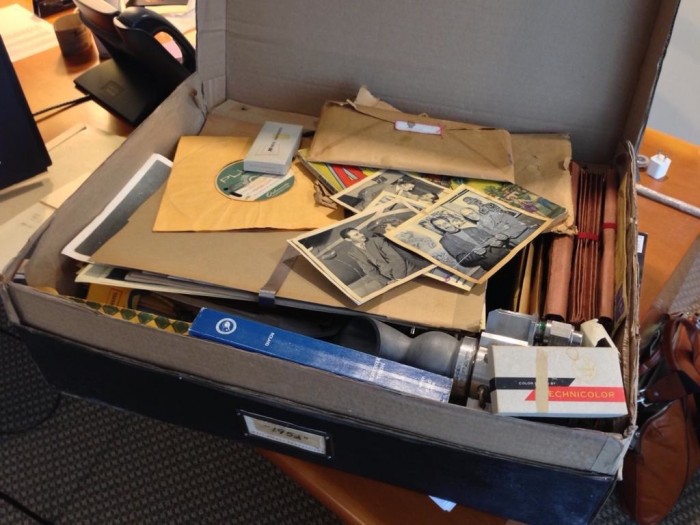 Peter: Yeah. How did the box come about? Was there ever a real box? Or was like how did that materialize?Jeff Jensen: You know, I understand that there are questions about the authenticity of the box. My relationship to the box was always wouldn't it be cool if this was real? So I don't question the authenticity of the box.
Peter: Yeah. How did the box come about? Was there ever a real box? Or was like how did that materialize?Jeff Jensen: You know, I understand that there are questions about the authenticity of the box. My relationship to the box was always wouldn't it be cool if this was real? So I don't question the authenticity of the box.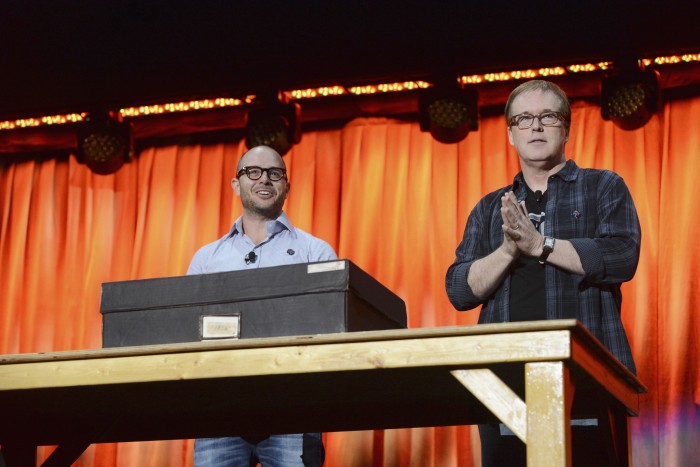 Peter: Okay. From what I understand, I have heard this legend of this pitch meeting that went into the Disney execs and there was the Disney archivist like showing the box and presenting it as if it was this real thing. Is that how it happened?Jeff Jensen: Who told you that story? Did Damon and Brad tell that story?Peter: I forget where I heard that. It wasn't Damon or Brad. It was probably a third hand source, but...Jeff: There were several occasions in which we showed people the box and it made, it became really handy like at a time when we knew, for a long time this movie from like from its early infancy when it started with Damon and was known as, you know, Project 1952. And then throughout 2011 into 2012, it was this awkward kind of thing where we were in the public eye, the project was in the public eye, but we weren't talking about it. And this really wasn't like an effort to be like super secretive, though I understand how secrecy works to the advantage of certain films. This was really about we really didn't have a lot to say yet about an original film that we didn't wanna spoil about much about. And so even within the Disney Company, I mean, there was a handful of people that knew that we were up to. It was like Sean Bailey, the President of Production. There was Brigham Taylor who was our executive on it. There was me and Damon. There were a couple other people involved. So there came a time when we were working on this thing and it started gaining some momentum that we had to start talking about an original idea. Like that wasn't like Star Wars. That wasn't based on any kind of brand. And sort of kind of like part of that education internally was let's talk about Disney futurism and talk about kind of like making a story that is suffused in that. So the box came in extremely handy as a visual aide of walking people through that stuff.
Peter: Okay. From what I understand, I have heard this legend of this pitch meeting that went into the Disney execs and there was the Disney archivist like showing the box and presenting it as if it was this real thing. Is that how it happened?Jeff Jensen: Who told you that story? Did Damon and Brad tell that story?Peter: I forget where I heard that. It wasn't Damon or Brad. It was probably a third hand source, but...Jeff: There were several occasions in which we showed people the box and it made, it became really handy like at a time when we knew, for a long time this movie from like from its early infancy when it started with Damon and was known as, you know, Project 1952. And then throughout 2011 into 2012, it was this awkward kind of thing where we were in the public eye, the project was in the public eye, but we weren't talking about it. And this really wasn't like an effort to be like super secretive, though I understand how secrecy works to the advantage of certain films. This was really about we really didn't have a lot to say yet about an original film that we didn't wanna spoil about much about. And so even within the Disney Company, I mean, there was a handful of people that knew that we were up to. It was like Sean Bailey, the President of Production. There was Brigham Taylor who was our executive on it. There was me and Damon. There were a couple other people involved. So there came a time when we were working on this thing and it started gaining some momentum that we had to start talking about an original idea. Like that wasn't like Star Wars. That wasn't based on any kind of brand. And sort of kind of like part of that education internally was let's talk about Disney futurism and talk about kind of like making a story that is suffused in that. So the box came in extremely handy as a visual aide of walking people through that stuff.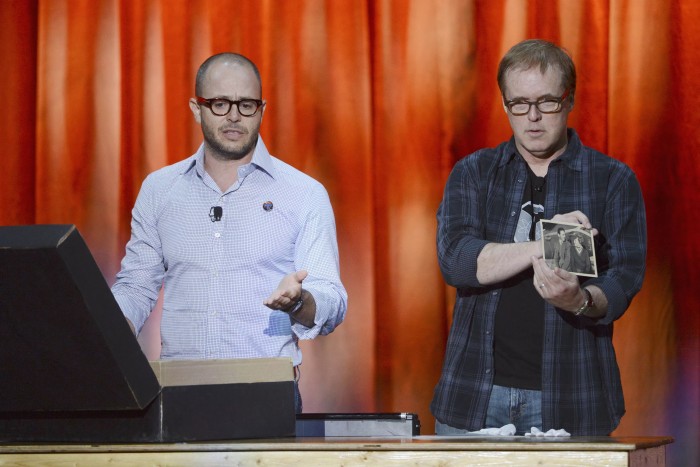 Peter: I've even heard from the executives in that room still don't even know that that the box might not have been a legit thing or there was maybe layers of that that were added by you guys...?Jeff Jensen: I can't speak to that. Because first of all, like I the, well I'll tell you my one experience with that was there was one time when Brad and Damon put on the show for everyone and it was my job to use this phone and record them. So all I was doing was watching them. I can't speak to the reactions.
Peter: I've even heard from the executives in that room still don't even know that that the box might not have been a legit thing or there was maybe layers of that that were added by you guys...?Jeff Jensen: I can't speak to that. Because first of all, like I the, well I'll tell you my one experience with that was there was one time when Brad and Damon put on the show for everyone and it was my job to use this phone and record them. So all I was doing was watching them. I can't speak to the reactions.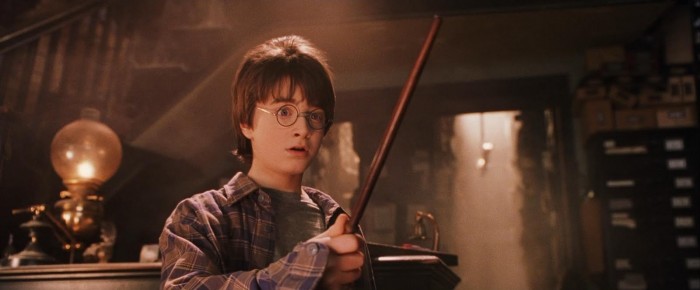 Peter: Okay. I was wondering how different were the initial rumblings of that idea from what it eventually evolved into? What were some of the biggest differences of like where it started and where it ended?Jeff Jensen: I think that there were always two different ways to come at this material. There is kind of like the Harry Potter approach, where kind of like, you know, at the end of the first act you're in the magical land and you're having an adventure there, right? But then there was the other approach that always fascinated Damon from the beginning and kind of like galvanized all of this and especially Brad when he got in. Which was sort of the journey of discovery. And we, if you've heard us talk about if you heard Brad and Damon talk about how Close Encounters of the Third Kind was sort of an inspiration for this movie, like when we use that comparison, we talk a lot about the narrative structure of like a guy, a main hero who has an encounter, who has a dream and like literally downloaded into his head. But now is asking questions like is that real? Is that authentic? What does that mean? What does that mean to me? And going on an adventure to prove it to himself and find it. We'd loved that idea of a narrative template for the story. And so to make it more or less about kind of like less about like you're in the magical world but ask questions about the magical world. And like and make it a journey of discovery in that regard.
Peter: Okay. I was wondering how different were the initial rumblings of that idea from what it eventually evolved into? What were some of the biggest differences of like where it started and where it ended?Jeff Jensen: I think that there were always two different ways to come at this material. There is kind of like the Harry Potter approach, where kind of like, you know, at the end of the first act you're in the magical land and you're having an adventure there, right? But then there was the other approach that always fascinated Damon from the beginning and kind of like galvanized all of this and especially Brad when he got in. Which was sort of the journey of discovery. And we, if you've heard us talk about if you heard Brad and Damon talk about how Close Encounters of the Third Kind was sort of an inspiration for this movie, like when we use that comparison, we talk a lot about the narrative structure of like a guy, a main hero who has an encounter, who has a dream and like literally downloaded into his head. But now is asking questions like is that real? Is that authentic? What does that mean? What does that mean to me? And going on an adventure to prove it to himself and find it. We'd loved that idea of a narrative template for the story. And so to make it more or less about kind of like less about like you're in the magical world but ask questions about the magical world. And like and make it a journey of discovery in that regard.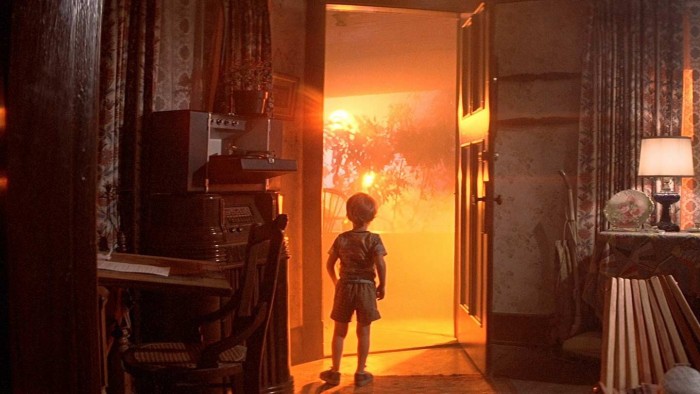 Peter: Totally.Jeff Jensen: So there's always those two different approaches. We briefly considered this one. We kind of worked on that one for a while like the Harry Potter approach. And that was literally like the first two and a half months of our work together. We got to the end of that process, we actually came up with a pitch that we really liked. And we talked about it and we said this is good. I think we like this other approach better. And that became our focus. And it grew really organically from there. So it was big. There was a huge vision. There were a lot of characters. There were a lot of locations. So a lot of our work was actually getting that thing smaller and tighter and narrower. But in terms of the story that you see, it evolved for sure but it's pretty much there.
Peter: Totally.Jeff Jensen: So there's always those two different approaches. We briefly considered this one. We kind of worked on that one for a while like the Harry Potter approach. And that was literally like the first two and a half months of our work together. We got to the end of that process, we actually came up with a pitch that we really liked. And we talked about it and we said this is good. I think we like this other approach better. And that became our focus. And it grew really organically from there. So it was big. There was a huge vision. There were a lot of characters. There were a lot of locations. So a lot of our work was actually getting that thing smaller and tighter and narrower. But in terms of the story that you see, it evolved for sure but it's pretty much there.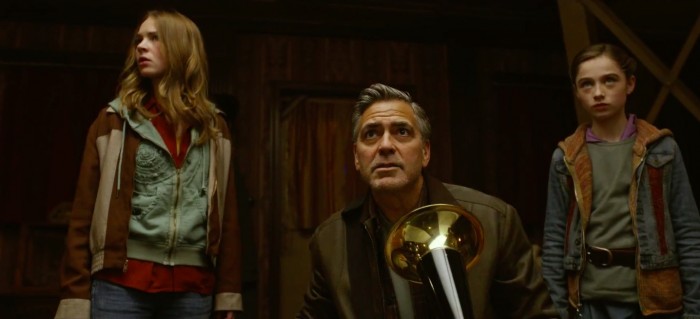 Peter: Was that first approach, was the main character more George's character or more like Britt?Jeff Jensen: No, the characters in terms of who they are and what they represent in the movie very much the same. So like Frank Walker, like Casey, Athena, Nix, those archetypes were very and those characters pretty much as existed they came pretty quickly. There were other characters that were a part of the journey initially, kind of like that we conceived like what if it would be great if there were multiple people touching pins. But then all of a sudden we realized we've just pitched like, you know, the Decalogue. So not a two hour movie. So we needed to kind of like hone that.
Peter: Was that first approach, was the main character more George's character or more like Britt?Jeff Jensen: No, the characters in terms of who they are and what they represent in the movie very much the same. So like Frank Walker, like Casey, Athena, Nix, those archetypes were very and those characters pretty much as existed they came pretty quickly. There were other characters that were a part of the journey initially, kind of like that we conceived like what if it would be great if there were multiple people touching pins. But then all of a sudden we realized we've just pitched like, you know, the Decalogue. So not a two hour movie. So we needed to kind of like hone that.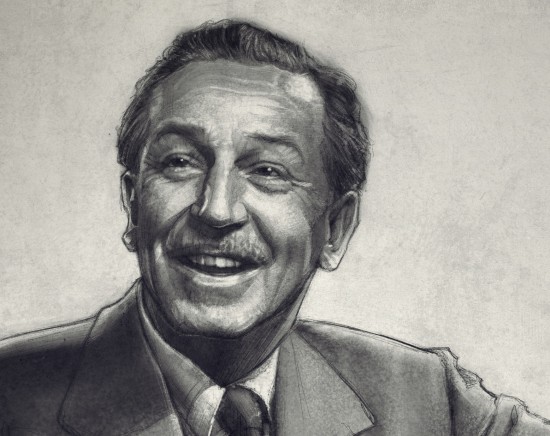 Peter: Was there ever a time when Walt Disney was gonna be a character in the story?Jeff Jensen: No. There, no. That was never seriously considered for a number of reasons. One, I don't know if we knew how to do that idea right, you know. And I also think that there was another movie that was coming out that had Walt Disney, but that was like a minor point. We loved the idea of talking about Walt Disney as a member of the secret society Plus Ultra. And I think and there were definitely versions of the script along the way where we talked about him a lot. And then talked about only a little. And like what's the right amount of sort of like meta to go for in the movie?
Peter: Was there ever a time when Walt Disney was gonna be a character in the story?Jeff Jensen: No. There, no. That was never seriously considered for a number of reasons. One, I don't know if we knew how to do that idea right, you know. And I also think that there was another movie that was coming out that had Walt Disney, but that was like a minor point. We loved the idea of talking about Walt Disney as a member of the secret society Plus Ultra. And I think and there were definitely versions of the script along the way where we talked about him a lot. And then talked about only a little. And like what's the right amount of sort of like meta to go for in the movie?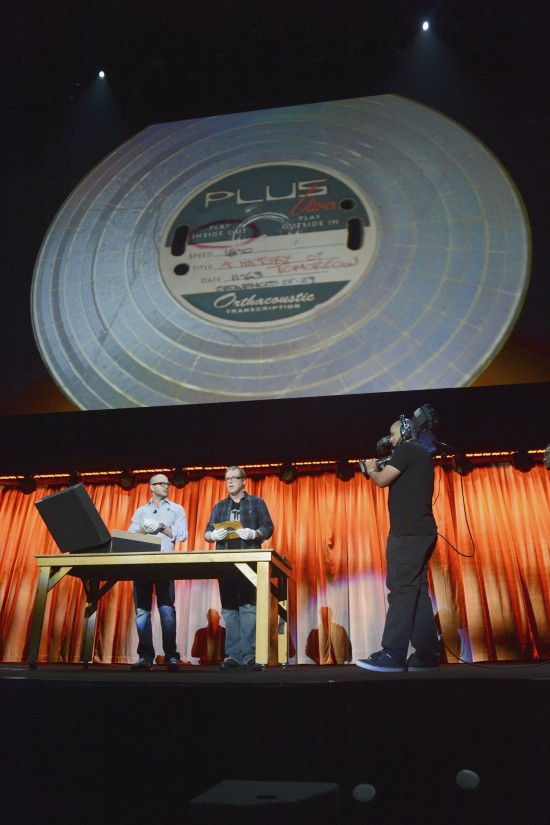 Peter: I kind of love the back story that you guys created be it with that box or like Plus Ultra and all that stuff. And I feel like there's so little of that in the film. How are future generations that come to this film going to be able to access that kind of stuff?Jeff Jensen: Well I think there's a couple different ways they can. I think that like, you know, we created a huge back story for the movie. A lot of it is in this book Before Tomorrowland. Which I wrote. Which is this sort of prequel novel that takes place in 1939. And it deals with the origins of Plus Ultra. Some early adventures of Plus Ultra. And so you get a big hit of Plus Ultra history. That stuff was created for the movie and we extrapolated into this novel back then. But I think as Damon and Brad have talked about there was always with this movie like it definitely wanted more back story. Like you felt the story like asking for it. But every time we did it, all of a sudden it went from like 120 page screenplay to like 150. And so like how do you avoid just like tons of exposition? How do you take that back story and make it really relevant to the action and adventure of the movie? It reminds me of if I can just say one more thing. It reminds me of you know how in like the seventh Harry Potter movie I think you had the whole back story about Dumbledore, right? Dumbledore and his brother and all of that. And that's a huge part of that book and it means a lot to readers. And in the movie, like they don't touch on it barely at all. It's like a line of dialogue. And that was because in those movies, that needed to be about Harry and what his relationship to everything was. For Harry, that stuff didn't matter. All that mattered was his adventure. I feel like there's something analogous for us in that. Where just like all that matters for our movie in terms of back story is what is important to these characters? And so but it was a dance. Like how much, you know, like can we have a lot? Can we have a little? It was a, it was tough to know. I'm glad that you really were galvanized by it. But it was definitely tricky to figure out how much it can support.Peter: Well thank you very much, Jeff.Jeff Jensen: Thank you.Peter: I appreciate it.
Peter: I kind of love the back story that you guys created be it with that box or like Plus Ultra and all that stuff. And I feel like there's so little of that in the film. How are future generations that come to this film going to be able to access that kind of stuff?Jeff Jensen: Well I think there's a couple different ways they can. I think that like, you know, we created a huge back story for the movie. A lot of it is in this book Before Tomorrowland. Which I wrote. Which is this sort of prequel novel that takes place in 1939. And it deals with the origins of Plus Ultra. Some early adventures of Plus Ultra. And so you get a big hit of Plus Ultra history. That stuff was created for the movie and we extrapolated into this novel back then. But I think as Damon and Brad have talked about there was always with this movie like it definitely wanted more back story. Like you felt the story like asking for it. But every time we did it, all of a sudden it went from like 120 page screenplay to like 150. And so like how do you avoid just like tons of exposition? How do you take that back story and make it really relevant to the action and adventure of the movie? It reminds me of if I can just say one more thing. It reminds me of you know how in like the seventh Harry Potter movie I think you had the whole back story about Dumbledore, right? Dumbledore and his brother and all of that. And that's a huge part of that book and it means a lot to readers. And in the movie, like they don't touch on it barely at all. It's like a line of dialogue. And that was because in those movies, that needed to be about Harry and what his relationship to everything was. For Harry, that stuff didn't matter. All that mattered was his adventure. I feel like there's something analogous for us in that. Where just like all that matters for our movie in terms of back story is what is important to these characters? And so but it was a dance. Like how much, you know, like can we have a lot? Can we have a little? It was a, it was tough to know. I'm glad that you really were galvanized by it. But it was definitely tricky to figure out how much it can support.Peter: Well thank you very much, Jeff.Jeff Jensen: Thank you.Peter: I appreciate it.
